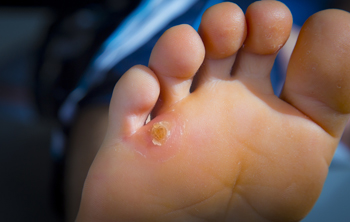
Corns on the feet develop as a result of excess pressure that is generally caused by the shoes that are worn. There may also be existing medical conditions that can lead to getting a corn, including hammer toe and bunions. Corns can cause extreme pain and discomfort, despite their small size. They are defined as small areas of hardened skin that forms on top of the toes, or on the side of the pinky toe. Additionally, corns may form on the soles of the feet, and they are referred to as seed corns. This type of corn is often associated with having dry skin, and may be found in clusters on the bottom of the feet. Applying a good moisturizer may help to keep the skin soft, and can possibly reduce the number of seed corns that can develop. Shoes may be difficult to wear, which may be from the weight the feet endure while walking or standing. Many patients have found temporary relief when their foot is soaked in warm water, and from wearing shoes and socks that fit correctly. Corns that will not diminish or disappear is often a reason a podiatrist is contacted. If this applies to you, please consult this type of doctor who can effectively treat corns on the feet.
Corns can make walking very painful and should be treated immediately. If you have questions regarding your feet and ankles, contact Anas Khoury, DPM of North Eastern Foot & Ankle Specialists. Our doctor will treat your foot and ankle needs.
Corns: What Are They? And How Do You Get Rid of Them?
Corns are thickened areas on the skin that can become painful. They are caused by excessive pressure and friction on the skin. Corns press into the deeper layers of the skin and are usually round in shape.
Ways to Prevent Corns
There are many ways to get rid of painful corns such as:
- Wearing properly fitting shoes that have been measured by a professional
- Wearing shoes that are not sharply pointed or have high heels
- Wearing only shoes that offer support
Treating Corns
Although most corns slowly disappear when the friction or pressure stops, this isn’t always the case. Consult with your podiatrist to determine the best treatment option for your case of corns.
If you have any questions please feel free to contact our office located in Passaic, NJ . We offer the newest diagnostic and treatment technologies for all your foot and ankle needs.
